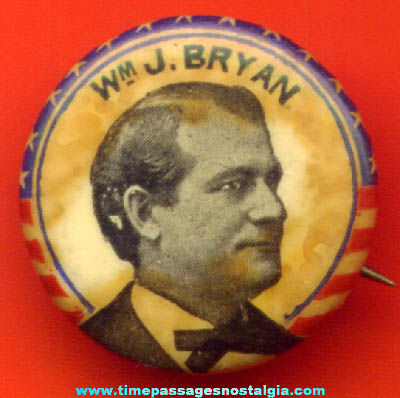
   | | | Any group of items being offered as a lot must be sold as a lot. | | | An Ever Changing Inventory | Quality Packing And
Postal Insurance | | We have an extensive inventory that is not yet on our web site. If there is something you are looking for and did not find, please send us your wish list. | All Original Items.
No Reproductions | | Combined Shipping And Handling | | Unique & Fun Nostalgic Items | | Worldwide Sales | | Fast Dependable Service |
| | | | The picture shows a view of this Old Celluloid William J. Bryan Political Campaign Pin Back Button. This pinback button is believed to be from the 1896 Presidential Campaign. It pictures William J. Bryan in a suit and tie within an American flag rim. The front is marked as follows: Wm J. BRYAN The back has a paper insert that reads as follows: SWEET CAPORAL CIGARETTE
Button Manufactured By
The Whitehead & Hoag Co.
Newark, N.J.
Badges & Buttons
Patented July 17, 1894, April 14, 1896, July 21, 1896 The pin back button measures 7/8'' wide. It is in good condition as pictured with some wear from use and water spotting. Below here is some Historical background information that was found online: ''...Bryan stumped the nation in a strenuous campaign, covering 18,000 miles in just three months. He spoke to wildly enthusiastic crowds, condemning McKinley as the puppet of big business and political managers. However, midway through his campaign, Bryan's pace faltered. His strategy for dual party support failed. Gold Democrats, not surprisingly, and some urban-based progressives who worried about Bryan's evangelistic style and moralistic fervor bolted the party. Moreover, as a Populist Party candidate, he never managed to break away from the agrarian base of his support once McKinley effectively linked protectionism to full employment.'' ''Bryan lost to McKinley by a margin of approximately 600,000 votes, the greatest electoral sweep in twenty-five years. McKinley received over a third more electoral college votes than Bryan. The Republican victory reflected a winning coalition of urban residents in the North, prosperous midwestern farmers, industrial workers, ethnic voters (except the Irish), and reform-minded professionals. It launched a long period of Republican power lasting until 1932, broken only by Woodrow Wilson's victory in 1912 (which occurred principally because of a split in the Republican Party)....'' |
|
Click on image to zoom.
 |